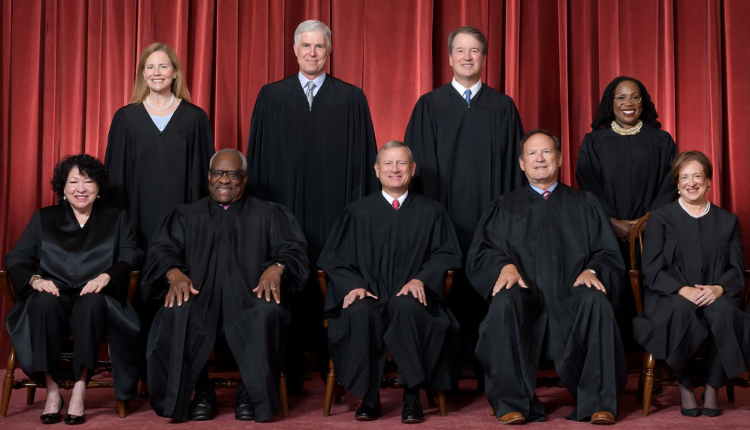Justices drop 'respectfully' in some dissents, but SCOTUS rancor is tamer than in past

The usual phrase used by U.S. Supreme Court dissenters is “I respectfully dissent.” But some justices dropped “respectfully” in major dissents last term. Photo by Fred Schilling via the Supreme Court website.
The usual phrase used by U.S. Supreme Court dissenters is “I respectfully dissent.”
But some justices dropped “respectfully” in major dissents last term and in their joint dissent in Dobbs v. Jackson Women’s Health Organization, the 2022 Supreme Court decision overturning the right to abortion, according to the Washington Times and the New Republic.
The change is a contrast to the year 2000, when then-Justice Ruth Bader Ginsburg “set tongues wagging” by using the words “I dissent” in Bush v. Gore, the decision that handed the election to former President George W. Bush, according to the Washington Times. Now, it’s becoming more common.
Sotomayor dropped “respectfully,” opting instead for “I dissent,” in the Supreme Court decisions striking down race-conscious admissions programs at Harvard University and the University of North Carolina, the Washington Times points out.
Her dissent in the cases brought by Students for Fair Admissions was joined by Justices Elena Kagan and Ketanji Brown Jackson, who also dropped the word “respectfully” in her separate dissent joined by Kagan and Sotomayor.
Sotomayor also used the words “I dissent” when the Supreme Court ruled the First Amendment protects a Christian web designer who refuses to create websites for same-sex weddings in 303 Creative v. Elenis. Her dissent was joined by Kagan and Jackson.
In some instances, the liberal justices’ dissents are irking justices in the majority, leading to unusual blowback.
Kagan wrote, “With all respect, I dissent,” when she disagreed with the Supreme Court decision striking down the Biden administration’s student loan forgiveness program.
But her opinion rankled Chief Justice John Roberts, according to the NPR and the Washington Times, which described his response as a “judicial spanking.”
In her dissent, Kagan had written, “In every respect, the court today exceeds its proper, limited role in our nation’s governance.” She wrote that the majority opinion “departs from the demands of judicial restraint” and uses a “made-up” doctrine to jettison the loan forgiveness plan. Her dissent was joined by Sotomayor and Jackson.
Roberts, who wrote the majority opinion, expressed his dismay.
“It has become a disturbing feature of some recent opinions to criticize the decisions with which they disagree as going beyond the proper role of the judiciary,” he wrote.
Roberts said the majority had used “the traditional tools of judicial decision-making,” and any misperception “would be harmful to this institution and our country.”
NPR also points to a concurring opinion by Justice Clarence Thomas in the university affirmative action case that the network described as a “full-on, sustained attack” on Jackson.
Thomas claimed that Jackson had a desire “to label all Blacks as victims” and that, in her view, the legacy of slavery “locks Blacks into a seemingly perpetual inferior caste. Such a view is irrational; it is an insult to individual achievement and cancerous to young minds seeking to push through barriers, rather than consign themselves to permanent victimhood.”
Jackson responded in a footnote that said Thomas “responds to a dissent I did not write,” and he “ignites too many more straw men to list, or fully extinguish, here.”
The Washington Times spoke with court watchers who said the three liberal justices feel frustrated, especially because they are likely to be in the minority for the rest of their lives. But all the justices mostly get along.
Vin M. Bonventre, a professor at the Albany Law School in New York, told the Washington Times that the mood of the Supreme Court pales in comparison to the era when then-Justice Sandra Day O’Connor was so repelled by the opinions of Thomas and Justice Antonin Scalia that she was pushed further to the left.
Often, Scalia was “incredibly nasty,” calling the analysis of O’Connor and Justice Anthony Kennedy laughable, ridiculous and absurd, Bonventre said. The Supreme Court dissension today “is much, much tamer,” Bonventre said. “It’s much tamer than it was even a short time ago when Scalia was on the court.”
Write a letter to the editor, share a story tip or update, or report an error.


